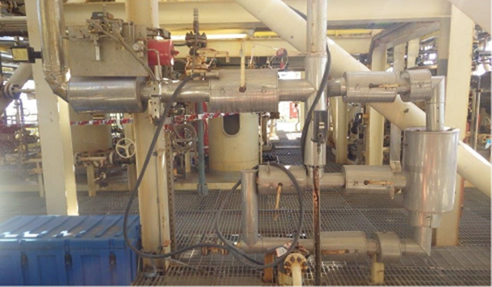Corrosion Control Services for Offshore Applications by Bellis Australia Corrosion is a natural process of structural deterioration, resulting from the chemical interaction between the material itself and its environment. While corrosion is mainly associated with metals, all types of materials are vulnerable to corrosion. As for metallic materials, the catalyst behind corrosion is the lowering of Gibbs energy. The manufacturing process of metal sheets involved in engineering components includes adding free energy on the material. The thermodynamic struggle forces the metals to return to their original low energy oxide state, leading to corrosion. Although corrosion is an inevitable process, substantial barriers or corrosion control methods can be used to slow down its progress. The rate of approach in corrosion control methods can be influenced not only by the nature of the material surface involved, but also by the environment where it is installed. In an offshore oil and gas facility, extensive infrastructure supports the entire plant. Corrosion control is necessary to preserve the structural integrity of the piping structures found in a high-risk environment like the LNG and petrochemical industries. It is also a way to mitigate the safety of the workers and prevent probable environmental problems caused by chemical spills or oil leaks. Unfortunately, the rate of corrosion in this type of application is accelerated by high levels of salt content surrounding the facility. The marine environment in which the offshore structures operate should then be considered for the type of corrosion control method. In addition to significant exposure to saltwater immersion, splash zone and salt air, offshore structures are vulnerable to severe abrasion and corrosive chemicals.
|
1300 740 564 Cooper Plains, QLD, 4108
|




 Insulation Accessories Supplier QLD by
Insulation Accessories Supplier QLD by How to Prevent Corrosion Under
How to Prevent Corrosion Under Why Use Foamglas for Fireproofing by
Why Use Foamglas for Fireproofing by ETFE Film for Antenna Protection by
ETFE Film for Antenna Protection by Pipe Insulation for Ductwork by Bellis
Pipe Insulation for Ductwork by Bellis Advantages of Pyrogel Aerogel Blanket
Advantages of Pyrogel Aerogel Blanket Marine Industry Skilled Labour Hire by
Marine Industry Skilled Labour Hire by Fibreglass Sleeving for Cable Protection
Fibreglass Sleeving for Cable Protection Protective Facade Materials for
Protective Facade Materials for Rockwool Partition Batts for
Rockwool Partition Batts for Benefits of Thermal Covers by Bellis
Benefits of Thermal Covers by Bellis Pre-Cladded Duct Insulation for Outdoor
Pre-Cladded Duct Insulation for Outdoor Fabric Expansion Joints for Round Ducts
Fabric Expansion Joints for Round Ducts Preformed Pipe Sections for Insulation
Preformed Pipe Sections for Insulation Storage Requirements for Versi-Foam
Storage Requirements for Versi-Foam Specialty Insulation Procurement QLD by
Specialty Insulation Procurement QLD by Advanced Fireproof Insulation Solutions
Advanced Fireproof Insulation Solutions Non-Combustible Insulation for High
Non-Combustible Insulation for High End Cap Gaskets for Piping by Bellis
End Cap Gaskets for Piping by Bellis Custom Sheet Metal Workers QLD by Bellis
Custom Sheet Metal Workers QLD by Bellis
